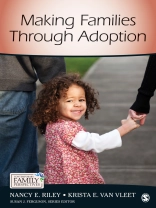Making Families Through Adoption provides a comprehensive look at adoption practices both in the United States and in other cultures, and a general understanding of the practices and ideology of kinship and family. The subject of adoption allows a window into discussions of what constitutes family or kin, the role of biological connectedness, oversight of parenting practices by the state, and the role of race, gender, sexuality, and socio-economic class in the building of families. While reviewing practices of and issues surrounding adoption, the authors highlight the ways these practices and discussions allow us greater insight into overall practices of kinship and family.
İçerik tablosu
Chapter 1. Adoption Across Cultures
Chapter 2. Adoption in the United States: Historical Perspectives
Chapter 3. Adoption: Private Decisions, Public Influences
Chapter 4. Race, Ethnicity, and Racism in Adoption and Fosterage Systems
Chapter 5. The Practices of Transnational Adoption
Further Exploration
Yazar hakkında
Krista Van Vleet′s research focuses on the practices and politics of kinship and gender among Native Andeans in Bolivia. She is particularly interested in how discourses of emotion such as ′love′ and ′envy′ are mobilized by individuals of different generations and genders, and how these discourses are situated in a changing social, political, and economic context. Her most recent research focuses on narrative and religion and explores the ways Andean Catholics, international missionaries, and evangelical Protestants in Bolivia express divergent conceptions of morality and gendered identity. She is also currently engaged in research on the interrelationships of narrative and non-verbal expression, and is exploring the use of digital video in research and teaching. She teaches courses in Anthropology, some of which are also cross-listed in Latin American Studies, Women′s Studies, and Gay and Lesbian Studies.












